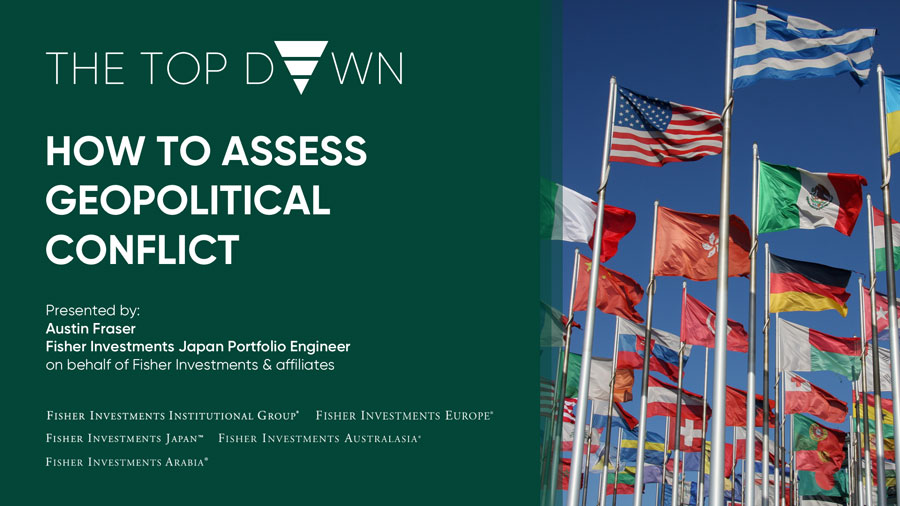Personal Wealth Management / Market Analysis
A Look Back at Markets’ Journey Through the Latest Middle East Conflict
In our view, markets followed their standard playbook.
Less than two weeks after the latest Middle East conflict began, rapid twists and turns have culminated in a ceasefire, leading some world leaders to declare the conflict is over. It even seems to have a name: The Twelve Day War.[i] The final days were anything but calm, including United States involvement, Iranian attacks on a US base in Qatar and even an Iranian parliamentary vote to close the Strait of Hormuz. Time will tell if the ceasefire holds, but for now, we think this is a good opportunity to assess markets’ behaviour during the conflict and see what lessons it holds. In our view, whilst war is always tragic and horrible at a human level, markets tend to digest and move on from these scenarios quite quickly—and seemed to do so this time.
Stocks’ reaction has been rather muted from the start, with returns basically flattish since 13 June.[ii] For perspective, daily moves were far milder than April’s US tariff-induced wildness.[iii] Oil appeared to be the main focus amongst commentators we follow, tied to supply concerns given the conflict’s geographical proximity to major production sites and oil shipping routes.[iv] The prospect of Iranian crude leaving the market or a blocked Strait disrupting tanker traffic caused Brent crude, the global benchmark, to leap from $70.84 on Thursday 12 June, the day before Israeli forces struck Iranian nuclear targets, to $76.00 the next day.[v] Though Brent crude prices proceeded to climb the following week, they fell sharply Monday, even before the ceasefire was announced.[vi] Yes, US airstrikes, Iranian counterstrikes on a US base in Qatar and a parliamentary vote to close the Strait all added up to falling crude prices. They have since continued falling, trading at $67.64 as of 26 June’s close—below pre-conflict levels.[vii]
It may seem counterintuitive that oil prices fell even as the conflict seemed to escalate at the weekend. But our research finds falling uncertainty can be a powerful tonic, and even before the ceasefire, we think investors were beginning to get it. In our view, US airstrikes answered the looming questions over whether and when other major powers would get involved. Iran’s counterstrike on the base in Qatar seemingly disproved widespread warnings that it would retaliate by attacking oil infrastructure in the region. And whilst its legislature voted to close the Strait, that vote was symbolic, in our view. The decision rests with the country’s top leaders, who have never closed the Strait despite multiple threats to do so over the past 40 years.[viii] That didn’t automatically mean they wouldn’t close it this time, but our research finds markets generally move on probabilities, not possibilities.
In our view, equity markets show this, too, beginning their rebound before the ceasefire was announced. We find this is a classic example of how markets work. At the risk of stating the obvious, war is a terrible, terrible thing. But, according to our research, terrible at a human level doesn’t always translate to terrible in stock or commodity markets. Generally, when regional conflict erupts, we find markets will first reflect the initial fear and uncertainty, and then that initial reaction will fade as the real scope becomes apparent. The MSCI World Index roughly followed this, zigzagging to a slight negative as the conflict broke out, yet starting its recovery before a ceasefire was reached—eventually surpassing pre-conflict levels.[ix] Israeli markets offer another way to see this, in our view. As we noted last week, the MSCI Israel is up bigtime since the war in Gaza began, and it was the MSCI All-Country World Index’s top-performing nation last year.[x] The TA-125, a broad local benchmark, rose 6.5% in local currency from market close on 12 June through 23 June, the day of the ceasefire.[xi] The market with the most direct exposure to the conflict remains resilient.
These situations can change quickly, so we will continue monitoring the situation and keeping our readers updated. But so far, it seems markets are following their typical playbook for regional conflict. Patience and discipline have historically served investors well at times like these, in our view.
[i] “Iran Orders Closure of Strait of Hormuz — Putting One-Fifth of World’s Oil Supply at Risk,” Anthony Blair and Caitlin Doornbos, New York Post, 22/6/2025. “Israel and Iran Agree to Ceasefire to Bring End to '12 DAY WAR,' Trump Says,” Jack Moore, ABC News, 23/6/2025.
[ii] Ibid. MSCI World Index return with net dividends in GBP, 13/6/2025 – 20/6/2025.
[iii] Ibid. MSCI World Index return with net dividends in GBP, 31/3/2025 – 23/6/2025.
[iv] See note i.
[v] Source: FactSet, as of 24/6/2025. Brent crude oil closing price in USD on 12/6/2025 and 13/6/2025. Currency fluctuations between the dollar and pound may result in higher or lower investment returns.
[vi] Source: FactSet, as of 26/6/2025.
[vii] Ibid. Brent crude oil closing price in USD on 26/6/2025. Currency fluctuations between the dollar and pound may result in higher or lower investment returns.
[viii] “RBN Energy Executive Explains Why Iran Isn’t Likely to Close the Strait of Hormuz,” Julie Coleman, CNBC, 23/6/2025.
[ix] Source: FactSet, as of 26/6/2025. Statement based on MSCI World Index returns with net dividends in GBP, 12/6/2025 – 25/6/2025.
[x] Ibid. Statement based on annual returns with net dividends for constituent members of MSCI All-Country World Index, in GBP, 31/12/2023 – 31/12/2024.
[xi] Ibid. TA-125 price returns in Israeli shekels, 12/6/2025 – 23/6/2025. Currency fluctuations between the shekel and pound may result in higher or lower investment returns.
Get a weekly roundup of our market insights.
Sign up for our weekly e-mail newsletter.

See Our Investment Guides
The world of investing can seem like a giant maze. Fisher Investments UK has developed several informational and educational guides tackling a variety of investing topics.




